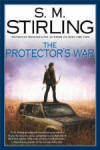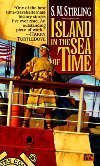Andreas Rosboch's Blog, page 46
November 18, 2011
The Protector's War (Emberverse II) – S.M. Stirling
 The Protector's war continues the Emberverse series begun with Dies the Fire. Eight years on from the events of the previous book, the world has somewhat settled after the change. The Protector, the Bearkillers and Clan Mackenzie have all consolidated their positions, and past adventures are turning into legend and myth. A showdown with the Protector must come, but not in this book. That is reserved for the final novel, A Meeting at Corvallis.
The Protector's war continues the Emberverse series begun with Dies the Fire. Eight years on from the events of the previous book, the world has somewhat settled after the change. The Protector, the Bearkillers and Clan Mackenzie have all consolidated their positions, and past adventures are turning into legend and myth. A showdown with the Protector must come, but not in this book. That is reserved for the final novel, A Meeting at Corvallis.
I enjoyed this installment very much, but it does suffer from middle of the trilogy syndrome. Just like The Empire Strikes Back, it introduces concepts and characters, setting the stage for the final showdown. If Stirling weren't so engaging regardless of what he is writing about, the story itself would be a bit boring. But even the sometimes very long descriptions of locales and nature paint rich and gorgeous pictures that are a sheer pleasure to read.
Dies the Fire (Emberverse I) – S.M. Stirling
 S.M. Stirling stole the island of Nantucket from the present time in the Nantucket series. In Dies the Fire, he postulates that when that event happened, all modern appliances (electronics, engines, etc) stopped working in "our" world. Also, all explosives (yes including gunpowder) burn much more slowly. To top it off, steam engines are vastly less efficient. This leads the characters involved to feel it must have been an outside influence (such as "Alien Space Bats) that created what comes to be called "The Change". The story does not go into The Change itself more than that however, rather focusing on a group of people having to live in the world post-Change.
S.M. Stirling stole the island of Nantucket from the present time in the Nantucket series. In Dies the Fire, he postulates that when that event happened, all modern appliances (electronics, engines, etc) stopped working in "our" world. Also, all explosives (yes including gunpowder) burn much more slowly. To top it off, steam engines are vastly less efficient. This leads the characters involved to feel it must have been an outside influence (such as "Alien Space Bats) that created what comes to be called "The Change". The story does not go into The Change itself more than that however, rather focusing on a group of people having to live in the world post-Change.
As so often with Stirling, I found myself unable to put the book down. He does have a way to make characters pop. The two protagonists, Juniper Mackenzie and Mike Havel, are uncommonly well equipped to handle the change, and draw to them people who also have survivor traits. They seem to have more than their fair share of luck, a theme which crops up here and there. This has led to criticism from some readers, who have said it simply isn't possible for the protagonists to make out quite so well. I would say that if they hadn't been so lucky and skillful, they would have died along with 90% of humanity in the year after the Change.
As usual, Stirling has done meticulous research into everything from archery to Wicca. It is a pleasure to watch his characters develop through the story.
November 17, 2011
Conquistador – S.M. Stirling
 John Rolfe, a WWII veteran, inadvertently opens a portal to an alternate timeline in his Oakland, California, basement. He and his old war buddies proceed to conquer this version of the Earth. In the other timeline, Alexander the Great lived to a ripe old age and the white man never arrived in America. The most advanced civilizations are still technologically in the middle ages. The "Gate" remains open, allowing Rolfe and his new nation to secretly smuggle precious metals to the original timeline (they know where to find it easily by using maps from our timeline) and manufactured goods to the other timeline. The "Gate Secret" is very tightly held.
John Rolfe, a WWII veteran, inadvertently opens a portal to an alternate timeline in his Oakland, California, basement. He and his old war buddies proceed to conquer this version of the Earth. In the other timeline, Alexander the Great lived to a ripe old age and the white man never arrived in America. The most advanced civilizations are still technologically in the middle ages. The "Gate" remains open, allowing Rolfe and his new nation to secretly smuggle precious metals to the original timeline (they know where to find it easily by using maps from our timeline) and manufactured goods to the other timeline. The "Gate Secret" is very tightly held.
But all is not well in paradise. A faction fight in the alternate timeline spills over into ours, and two Fish and Game Warden find themselves caught up in the middle, then exiled through the gate. They must now team up with the "good" alternate timeline faction (Rolfe's granddaughter, for one) to defeat the evil faction.
I enjoyed "Conquistador". It is adventure pure and simple. The action scenes are masterful. The setting, as well as the social, economic and ecological discussions are both entertaining and intriguing. However, I do think that Stirling could have delivered a better plot. The ending is rather abrupt, and some of the moral issues prominent in the first half of the book (is the whole idea of conquering a new world and setting yourselves up as a benevolent dictatorship really a good thing?) are conveniently dropped by the wayside at the end. And then there are the characters. Likeable as they may be, our heroes are a little too perfectly intelligent, likeable and generally extremely fit and good looking. While I am a sucker for happy endings, I still found it a little bit too happy and perfect and neatly tied up, even though the very last page does open the door for sequels.
The Peshawar Lancers – S.M. Stirling
 This singleton is set in the year 2025, but not in our future. The premise is that a shower of comets hit Earth in the 1860′s, pushing civilization to the brink of extinction both by the impacts themselves and related general cooling. The British Empire relocated its seat to Delhi, and the story takes place in what is India, Pakistan and Afghanistan in our timeline. The Empire is ruled by the Angrezi Raj, or King-Emperor.
This singleton is set in the year 2025, but not in our future. The premise is that a shower of comets hit Earth in the 1860′s, pushing civilization to the brink of extinction both by the impacts themselves and related general cooling. The British Empire relocated its seat to Delhi, and the story takes place in what is India, Pakistan and Afghanistan in our timeline. The Empire is ruled by the Angrezi Raj, or King-Emperor.
This is classic swords and horses adventure. Very gripping, with some great characters. The middle of the book was a little "unfocused", and Stirling could have added dates to the section headings, since there is a bit of jumping backwards and forwards. The end is one long drawn-out cliffhanger after another. As usual, Stirling proves that he knows his history, weapons and tactics. A real page turner and recommended for for high adventure buffs
November 16, 2011
What Distant Deeps (RCN VIII) – David Drake
 Peace has broken out between the Republic of Cinnabar and The Alliance of Free Stars. Captain Leary and the Princess Cecile are tasked with taking a new commissioner to the backwater planet of Zenobia. It is supposed to be a quiet and uncomplicated mission, but of course danger and intrigue are lurking. A plot by a local planetary ruler to invade Zenobia soon throws a wrench in the works.
Peace has broken out between the Republic of Cinnabar and The Alliance of Free Stars. Captain Leary and the Princess Cecile are tasked with taking a new commissioner to the backwater planet of Zenobia. It is supposed to be a quiet and uncomplicated mission, but of course danger and intrigue are lurking. A plot by a local planetary ruler to invade Zenobia soon throws a wrench in the works.
I enjoyed this one greatly. Leary and Mundy are in fine form, The space action is very good, especially the final battle which takes up a good chunk of the book. There is also an abundance of colorful characters, even more than usual for the RCN series.
November 15, 2011
Drakas! – S.M. Stirling (Editor)
 This anthology features short stories set in Stirling's Draka universe. Twelve authors contribute. There are some real gems here, but you probably won't appreciate them if you haven't read the Draka series first.
This anthology features short stories set in Stirling's Draka universe. Twelve authors contribute. There are some real gems here, but you probably won't appreciate them if you haven't read the Draka series first.
The Nantucket Series – S.M. Stirling


 This alternate history series consists of:
This alternate history series consists of:
Island in the Sea of Time
Against the Tide of Years
On the Oceans of Eternity
The island of Nantucket and the Coast Guard barque Eagle are mysteriously sent back in time to around 1000 BC. Being too small a society for self-sufficience, the inhabitants (including many seasonal visitors) must go out in the world and survive using technology and cunning. Epic adventure, well researched and well written.
Note: Stirling's Emberverse series is connected to the Nantucket series since the event that sends Nantucket back in time also triggers the "Change" in Emberverse.
November 14, 2011
The Rose Sea – S.M. Stirling & Holly Lisle
 I am not a big fantasy fan, but this does not read terribly much like fantasy. There is a definite scarcity of bearded wizards and annoying halflings. It's more like a pirate/explorer story, and quite entertaining.
I am not a big fantasy fan, but this does not read terribly much like fantasy. There is a definite scarcity of bearded wizards and annoying halflings. It's more like a pirate/explorer story, and quite entertaining.
Islands in the Net – Bruce Sterling
November 13, 2011
Interface – Neal Stephenson & Frederick George
 This novel is about a presidential candidate with a chip in his head connecting him to a computerized polling system. There's much more to the story than that of course, and it was a bit of fun, with some really great characters. If you love everything that Stephenson has written, you might enjoy this too.
This novel is about a presidential candidate with a chip in his head connecting him to a computerized polling system. There's much more to the story than that of course, and it was a bit of fun, with some really great characters. If you love everything that Stephenson has written, you might enjoy this too.
The copyright for this one is from 1994 in the name of Stephen Bury (Frederick George is Mr. Bury's pseudonym). My theory is that Stephenson rewrote some of the book. You can pretty much tell where Stephenson has had a hand in the writing, and this makes it uneven in quality.









